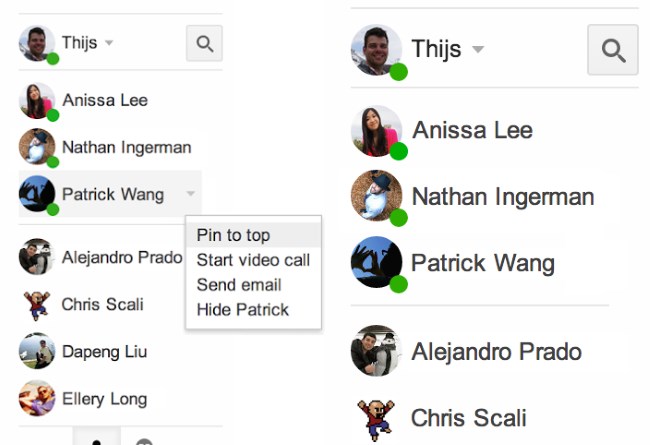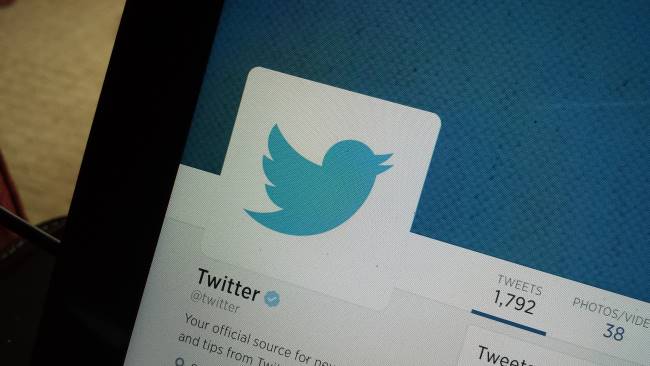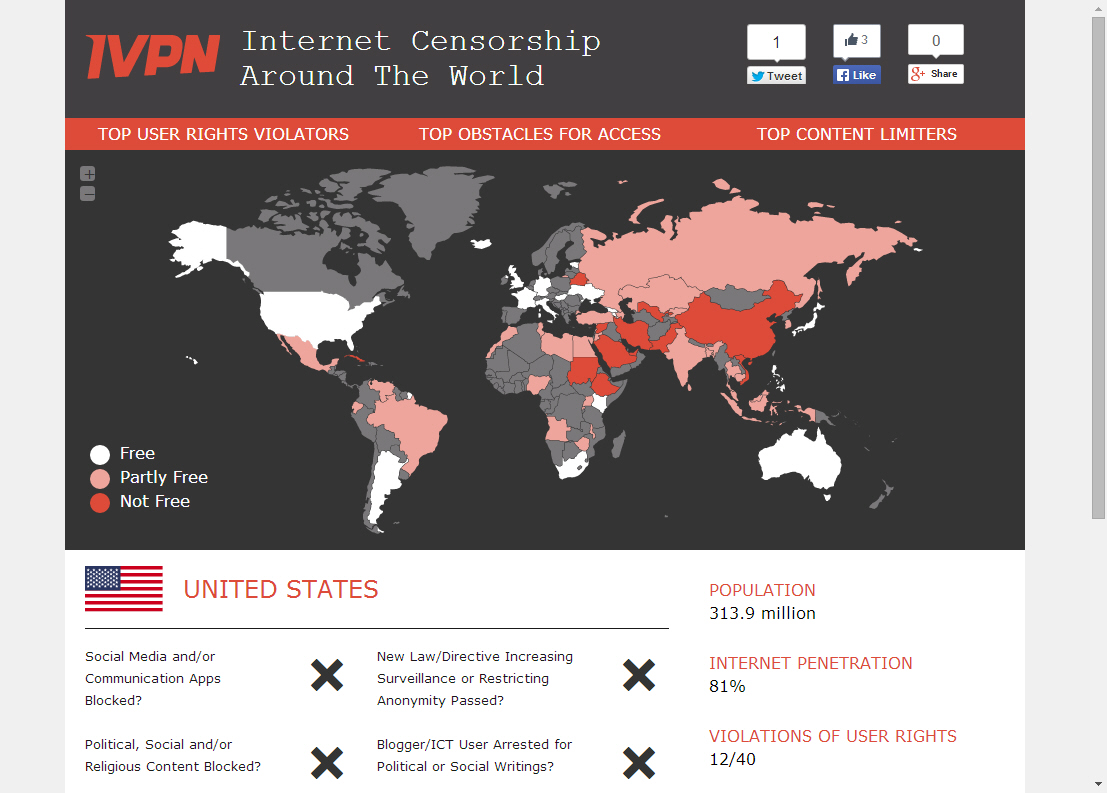
UK kids spend over £10 per week on tech
British children are more likely to be spending their money on technology than on comics and chocolate according to new research by the Halifax bank.
Three-quarters of 8 to 15 year olds have a mobile phone, 65 percent own an MP3 player and 87 percent a games console. Hardly surprising then that they say they spend most of their cash on games and downloads.

Google makes it easier to see who's online in Hangouts for Gmail
The point of any chat system is to make it easier to communicate with others. This is something that Google Hangouts has singularly failed at, for one reason. Rather than making it obvious which of your contacts are online, it has -- up until now -- displayed a chronological list of the conversations you have held with people. This is about to change. Rolling out over the next few days, is an update which will see your online contact move to the top of your chat buddy list.
This might seem like a small change, but it's one that has been requested for some time now. Google seemingly thought that the tried and true way of ordering contacts was due for a shakeup -- now we know that the experiment didn’t really pay off. There's another new feature to play with as well. Just as Chrome -- and other browsers -- make it possible to pin frequently used tabs so they are always available, now Hangouts users will be given the opportunity to pin contacts to the top of their buddy list.

Paranoid much? Americans are now self-censoring online after Snowden's NSA revelations
The effects of Edward Snowden's revelations about the activities of the NSA continue to be felt. Internet users are now familiar with the idea that what they do online is possibly (probably?) being monitored in one way or another. Some users have taken to the likes of Tor in a bid to increase security and anonymity, but there has also been a more interesting side-effect. Figures released by "nonpartisan fact tank" the Pew Research Center suggests that a "spiral of silence" has developed as Americans start to censor themselves online.
The research group conducted a survey of more than 1,800 people in the middle of last year and found that while most people (86 percent) were quite happy to talk about state surveillance in person, less than half (41 percent) were willing to do so on Twitter (itself involved in censorship). This self-censorship is an interesting repercussion of the NSA's activities, and it seems that social network users have been hardest hit:

V.BTTN is a programmable Bluetooth button that can do anything your phone can
Think about wearable tech and your mind probably jumps to watches first. V.BTTN is a little different. It's a programmable button that links smartphones, tablets and computers via Bluetooth and it can then be used to trigger all manner of events. Looking for a remote shutter trigger for your smartphone? V.BTTN can do that for you. Need a remote control to start and stop recording? Got that covered too. The device comes from VSN Mobil and is available now for $59.99. It's one of those pieces of hardware billed as having virtually limitless possibilities, but this is one instance where the claim is justified.
What the button does depends entirely on the app you decide to link it to. It's slightly more advanced than just "hit the button" -- there are short and long press options, as well as gesture support thanks to a built-in accelerometer. As standard, V.BTTN is just a button. You can stick it in your pocket or bag and carry it around with you if you like, but there are also a number of accessories.

One weird trick -- Facebook to clear newsfeeds of click-bait headlines
Click-bait articles are rife online. Countless websites ply a trade in leading headlines designed to lure readers in, giving as little away as possible as an encouragement to click through. A virtual prick-tease, if you will. Sometimes the click is worth it, but all too often the article -- particularly on tabloid-style newspapers, magazine websites and sites peddling listicles -- is pointless or misleading. A suggestive question, the promise of sex, inappropriate references to the iPhone 6, the implication of free money... the possibilities for click-bait are virtually endless. It -- understandably -- annoys a lot of people, and it has annoyed Facebook enough for the social network to take a stand.
You've no doubt noticed that your Facebook newsfeed has become clogged up with countless "one weird trick", "ten ways to give her the best orgasm ever", and "you'll never guess what!" headlines. Now Facebook is taking steps to limit the appearance of such articles so that what users see is more interesting and relevant. In a post on the Facebook blog, it has been announced that two key updates are to be made: "the first to reduce click-baiting headlines, and the second to help people see links shared on Facebook in the best format".

In India it is illegal to like blasphemous online content
In the latest blow for free speech, the government of the southern Indian state of Karnataka has passed legislation that makes it illegal to upload, share, or like content "with a view to hurt religious sentiments knowingly or unknowingly". Let's put aside the odd paradox of being able to have a "view" to do something, but to do it "unknowingly", and look at the history of this. Back in June, Karnataka police warned citizens about the type of things that were covered by the Information Technology Act.
Warning notices appeared in newspapers (of all places):

Rebel NSA and GCHQ agents are actually helping make Tor more secure
For anyone looking to stay anonymous online, Tor seems like an obvious option. At the same time, it could lull users into a false sense of security -- after all, this is a network that was, at least in the past, funded by the military and US government -- and conspiracy theories abound that Tor is nothing more than a honey trap to catch the kind of people who have a need for anonymity because of their nefarious activities. The network has evolved over the years and now agencies such as the NSA in the US and GCHQ in the UK are actively seeking out vulnerabilities so they can crack the network. But the relationships are actually far more complex than that.
According to Andrew Lewman, chief of operations at Tor, the same agencies that are trying to break Tor are also posting tips anonymously about the vulnerabilities that have been found -- giving a chance for them to be patched. Talking to the BBC Lewman said:

How security breaches have changed the cyber landscape
There's no doubt that security breaches are becoming more common. According to the US Government Accountability Office cyber incidents increased by 782 percent between 2006 and 2012.
But how does this impact the world at large? Security management company SRC Cyber has put together an infographic looking at some of the most infamous occurrences over the last decade and how they've affected the global cyber landscape.

US states with faster internet access have smarter people
Despite several doomsday claims that the internet is breeding a generation of morons, new analysis suggests the opposite may be true.
We gathered the 2013 average ACT scores for each state from act.org and compared them with the 2013 internet speed data from Akamai that was highlighted in a recent Broadview article. We found a correlation of .57. This strong correlation shows that students from states with faster internet speeds have higher ACT scores on average.

Google sets its sights on kids with child-friendly versions of YouTube and Gmail
There are many parts of the internet that are blocked to children under the age of 13. Facebook, for instance, implements an age restriction and Google is another online firm that prevents younger web users from setting up accounts. But all this could be set to change. First reported by The Information, Google has plans to open up its service to a younger audience. This does not mean that youngsters will be free to sign up for an account and browse through the contents of YouTube without restrictions. Parents will be able to sign their children up for an account and retain control over what they are able to do online.
One of the primary concerns many people have about Google -- regardless of their age -- is privacy. Google has a proven track record in delivering tailored content and advertisements to its users, and this is something that is at odds with laws around the world when it comes to children. The news coincides with UK plans to experiment with age ratings for online videos, and privacy and child protection groups are already voicing their concerns. Of course, there is nothing to stop someone of any age from signing up for a Google account; it's easy to stretch the truth with dates of birth online. But Google specifically targeting children with its services is unchartered water.

Twitter accepts removal requests for images of deceased, tinkers with timelines (again)
In the wake of the death of Robin Williams, Twitter announces that it will now accept image removal requests from relatives of deceased individuals. Williams' daughter Zelda was forced to leave Twitter having been inundated with a barrage of mocked up images of her deceased father.
In the aftermath of the actor's suicide, Twitter explained that it would improve its policies. The result is an update to the way in which death is handled on Twitter. The families of deceased people have been able to request the deactivation of an account, but now new rights have been introduced.

Would you use a tablet to make a phone call?
Phablets -- super-sized phones -- serve a useful purpose. They allow consumers to carry just the one device that can be used as a smartphone and act as a tablet. However, while phablets are growing in popularity worldwide, in Asia tablets with cellular voice capabilities are gaining traction.
According to IDC’s Worldwide Quarterly Tablet Tracker, in Q2 2014 nearly 25 percent (around 3.5 million units) of all the tablets shipped in the Asia/Pacific excluding Japan (APeJ) region had cellular voice capabilities, allowing users to make calls by holding a tablet up to their faces. And we’re talking devices with screen sizes of 7 inches and up.

Plans to slap age ratings on online videos are completely and utterly pointless
Head to the stores to look for real, physical DVDs and Blu-rays, and you'll probably find that there's an age rating on them. Now plans are afoot to bring the same idea to the web. As insane an idea as this may sound, this is actually happening, and it is completely pointless and unworkable. Initially starting off with the involvement of YouTube and Vevo, the scheme is the brainchild of UK Prime Minister David Cameron and will start as a pilot program in October. It's something that is likely to appeal to concerned parents, but the practicalities are a rather different matter.
Announcing the ratings plan, Cameron said: "We shouldn't cede the internet as some sort of lawless space where the normal rules of life shouldn't apply. So, in as far as it is possible, we should try to make sure that the rules that exist offline exist online. So if you want to go and buy a music video offline there are age restrictions on it. We should try and recreate that system on the internet".

Satellite broadband finally opens up the internet to me
A few weeks ago I complained bitterly about my atrocious internet connection. The impact of a deathly slow and unnervingly unstable connection is hard to overstate. Tension and frustration chez Wilson reached boiling point. Nerves were frayed and tempers short. But as I sank into the bleak, hellish broadband abyss, a hand reached out to save me. The hand was extended by the suitably named Satellite Internet who took pity on me having read of my plight. A trial of satellite broadband was duly offered, and I don’t think I could have said "yes, please" faster. It's something I've considered before, but the startup costs had put me off.
Satellite Internet's service uses Astra satellites, the same ones used to deliver satellite TV to Europe. This means that a smaller dish than you might expect is needed. Forget the monster installations you may have seen in people's gardens in years gone by, these days the dishes have shrunk to something that's just about the same size as those used for TV broadcasts. Installation was delayed due to my trip to the Isle of Skye (which, incidentally, has blisteringly fast internet considering it's a tiny island connected to the mainland with a small bridge), but this morning two installation engineers arrived at 8:00, having travelled more than two hours to reach me.

How much is your internet being censored? Point and click guide
The issue of internet freedom is seldom far from the news at the moment, but exactly how much are the governments in different countries restricting what their web users do?
Online privacy service IVPN has produced an interactive map showing levels of internet censorship around the world. You can simply click on a country to see how it rates.
